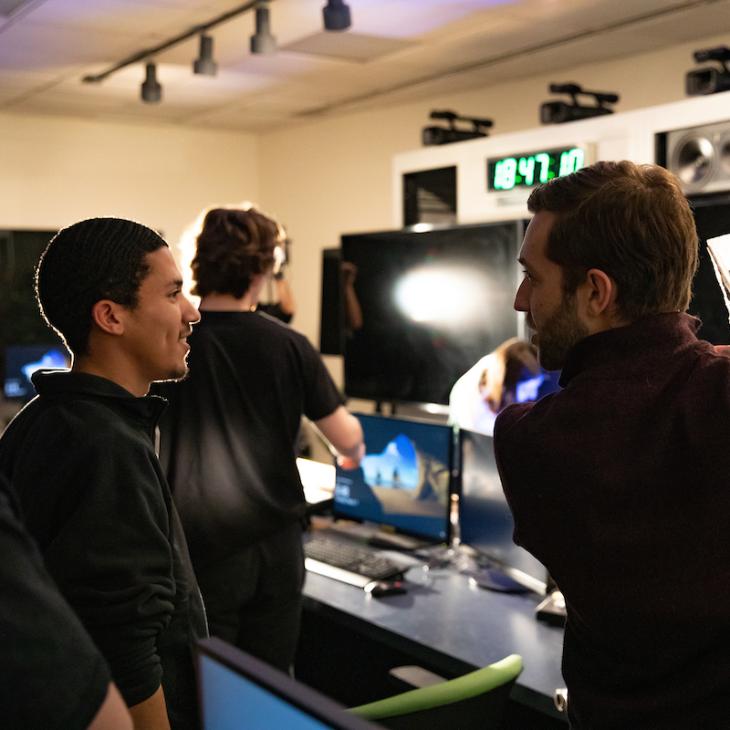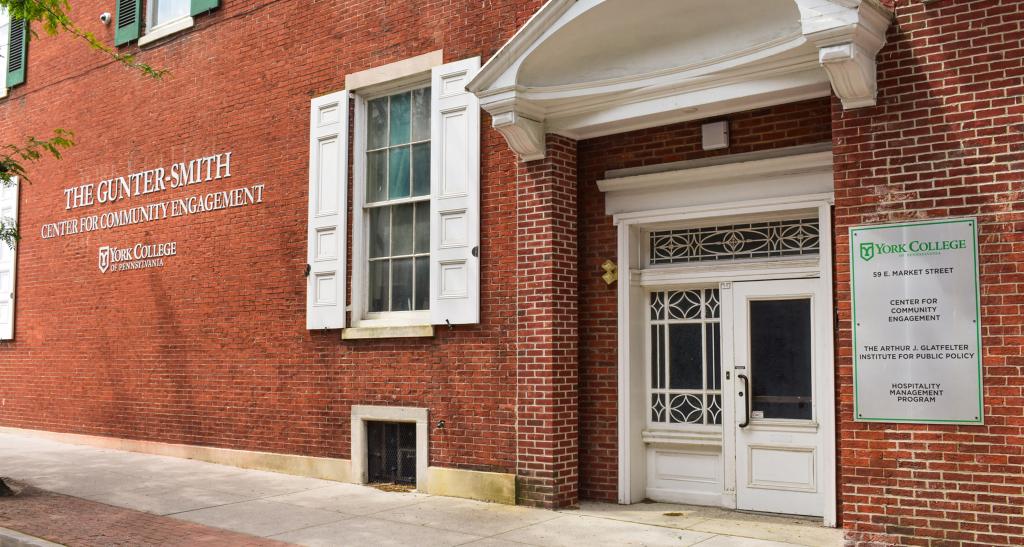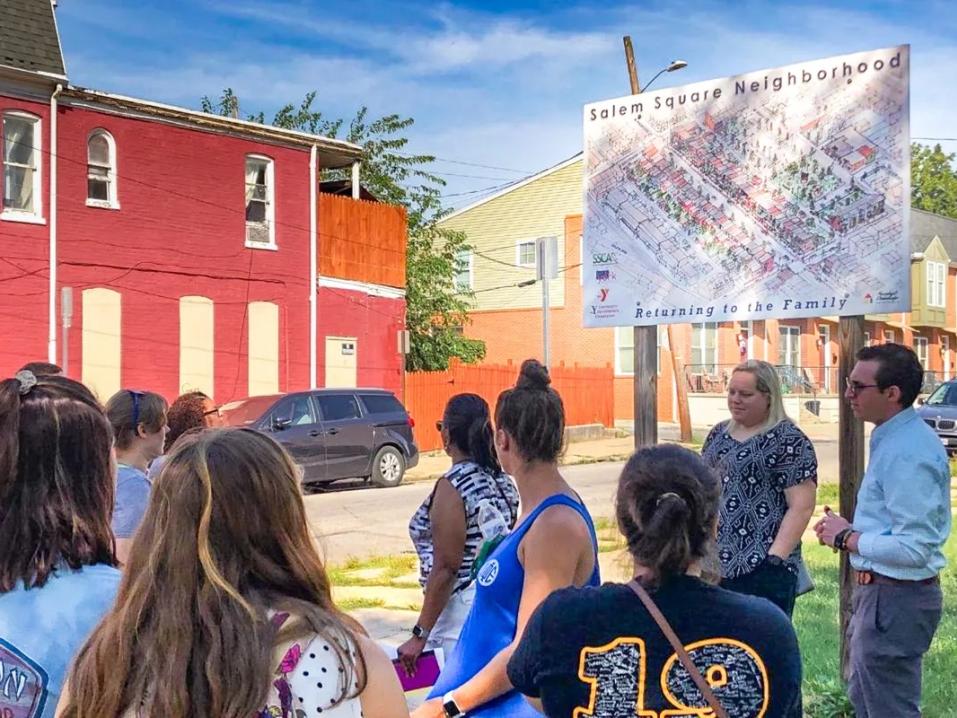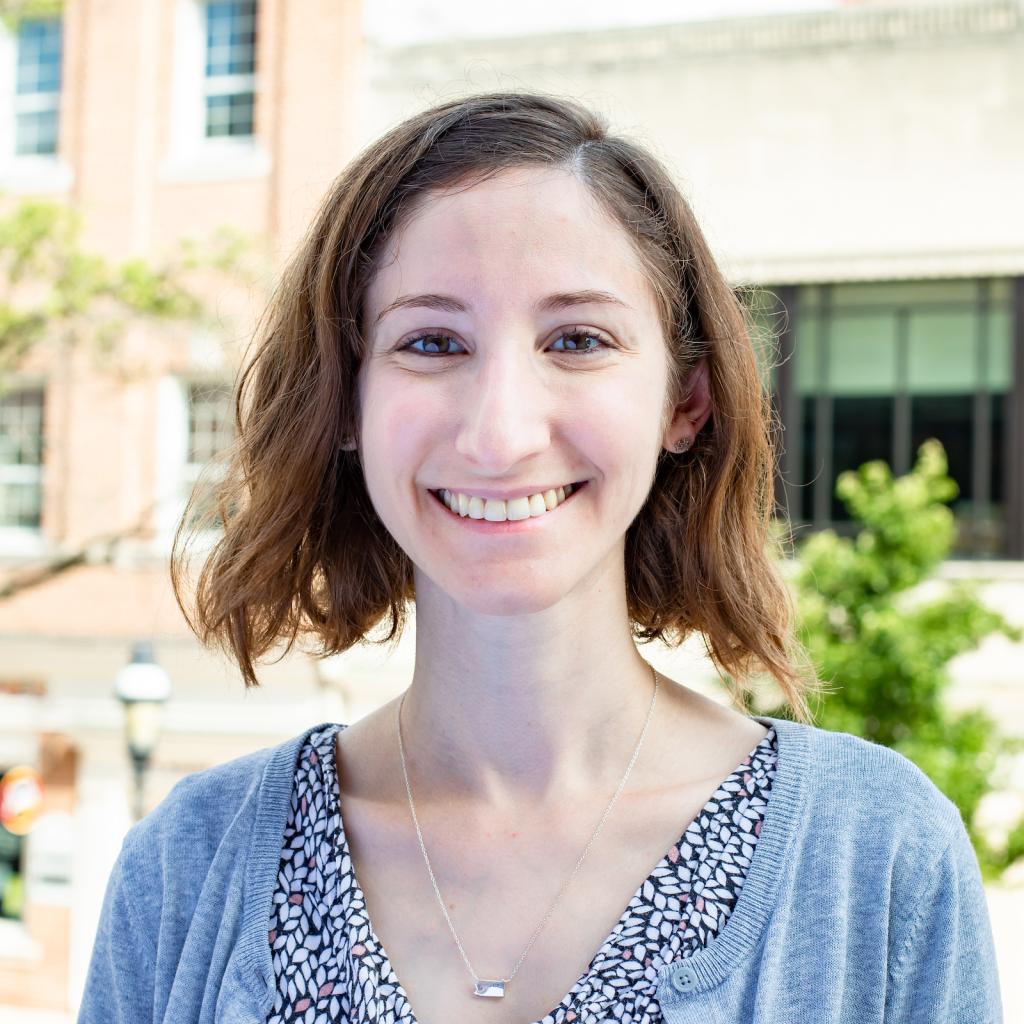
Engage in real-world projects.
Have you ever asked a teacher (or yourself) “how will I use what I am learning in the real world?”
Project- and Community-Based Learning (CBL) can help you answer that question. At York College, you’ll have the opportunity to use what you learn in the classroom to engage in real-world projects with community partners! The old-school model of merely learning facts is not sufficient in today's world. Solving highly complex problems while working on authentic projects in the community will provide students with 21st-century skills.
Working side by side, community members and students seek solutions to current social, business, and government problems. Merging classroom learning outcomes with community interaction allows students to engage in opportunities that make learning more meaningful and more significant.
All of our students have the opportunity to work on real-world projects with community partners in their First-Year Seminar courses through their Capstone Courses. They are guided and mentored by their professors, becoming directors and managers of their learning process.
We know by experience that students are more engaged in their education and retain their learning more fully when they apply classroom learning in real, hands-on environments. And when you’re ready to graduate, you’ll have a wealth of experience to tell prospective employers about — real accomplishments that show not only what you’ve learned, but what you’ve done!
Working together, the Center for Faculty Excellence and the Center for Community Engagement connect classes with community partners in which you can learn by doing as you address their real needs.
Explore Featured Projects
Community-Based Learning at York College
Solving highly complex problems requires not only fundamental academic skills — like reading, writing, and math — but also 21st-century skills such as collaboration, communication, time management, research, information synthesis, problem-solving, and utilizing technology (including video conferencing and virtual collaboration tools). Participating in CBL helps students to hone these skills, which are valuable assets in any career.
CBL activities and projects are defined by several characteristics:
- They originate in real community needs as defined by the partner organization.
- They are founded in careful research and analysis to make data-informed decisions.
- They are propelled by investigation of defined goals.
- They are led by students and mentored by teachers.
- They are significant to the student.
- They consist of a task, a process, and/or a product, as well as the opportunity for reflection on learning.
CBL courses incorporate these characteristics by guiding students to move toward a particular learning goal while addressing a specific need in the community. As part of a CBL course, you will:
- Apply fundamental academic skills and 21st-century skills to address a real-world issue.
- Think critically, ask questions, and practice intelligent listening.
- Cultivate expertise in the subject matter and develop ownership over your innovations.
- Incorporate feedback from both the instructor and your peers as you fine-tune your ideas.
- Publicly present your findings, demonstrate your knowledge, and respond to questions and comments.
Community-Based Learning (CBL), most simply, is real-world learning. Rather than simply being tested on what you know, it helps you test yourself on what you do.
Rather than starting with a list of things to learn, CBL courses begin with a problem to solve, a need to be met, or a project to be completed. This allows students to identify what they need to learn to complete a real project with a community partner and to apply theoretical course content on a deeper, more direct level. It has been proven that CBL promotes not only academic understanding but also organizational and social understanding and the ability to work in teams — key skills employers look for as they hire and make decisions about promotion and advancement. CBL creates a three-fold benefit: engaged teaching, engaged students, and an engaged public.
As a student, CBL gives you the opportunity to:
- Build a network of relationships.
- Engage directly with community partners.
- Gain experience working in a professional setting.
- Develop social and cultural awareness.
- Hone communication and interpersonal skills.
- Practice critical thinking, reasoning, and decision-making.
- Utilize creative and innovative strategies.
- Identify and select the appropriate tool for the task.
- Collaborate with community partners and the public to address challenges.
- Develop a sense of personal and civic responsibility.
- Gain self-actualization and develop self-worth.
To learn more about Community- and Project-Based Learning, visit these sites:
- Dr. Corey Brooks offered a course that examined the effect of past public policies on current practices in York. After interviewing community stakeholders and reviewing historical materials, the class focused on policies affecting poverty. They presented their findings to a group of community members, including our mayor and other elected officials, and were also invited to present about this course at the American Historical Association.
- York College is known for its ongoing partnerships with socially-driven businesses—and students in Renee Tacka’s marketing class take those partnerships seriously. Working closely with Fred Walker and Anthony Moore of Four Squares Construction and Development—a local firm committed to increasing the affordable housing supply in York—students offered targeted business and marketing feedback gathered through lengthy conversations and careful research. Their recommendations left a lasting impact on the two co-founders, leaving Anthony Moore to say about the students, “We look at you as extended members of the Four Squares brand.”
- Students in Dr. Jacqueline Beatty’s Museum Studies class used their study of history to make a clear statement: everyone deserves to have their story told. Throughout the semester students completed archival research that built upon the work done for Project Penny Heaven, an effort led by York College alumna Jamie Noerpel to remember and recognize those buried in unmarked graves in the field adjacent to Prospect Hill Cemetery. The class culminated in a public exhibition titled Who has the Right to Memorialization in Death?, which was put on display at the College’s Center for Community Engagement.
- The recently reopened Yorktowne Hotel has offered nearby residents and faraway tourists a venue to convene, dine, and stay. It’s become a hub for hospitality in the city—a hub that students at York College have lent a hand in helping create. Since the Yorktowne had first begun renovations, students in the College’s Hospitality Management program, as well as Graham Collaborative Innovation Fellows, have worked with the hotel in visioning sessions, business planning, and historic preservation projects. So strong were these partnerships between the students and the staff that a number of them pursued positions at the Yorktowne after graduating, applying their classroom knowledge and community experience again in service of a better York.
The Honors Community reflects York College’s commitment to community-based, hands-on learning and to being a strong resource for the greater York community, its people, and its businesses and organizations. This group of Scholars and their mentors provide human-centered research and actions that take on the knotty problems and offer “new-to-the world” innovations that address those problems.
Using the principles of “human-centered design” (design thinking) alongside the close support of faculty mentors has propelled these students to new heights. Here’s a snapshot of what they’ve done:
- Presidential Research Fellow Alayna Muñoz ’23 studied how nonprofits serve people with intellectual or developmental disabilities and how they use input from those communities to shape the direction of their organization.
- Eisenhart Scholar Brianna Simms ’23 found novel ways to serve the community using her graphic design skills. Throughout her time at the College, you could find Brianna creating posters or advertising designs for the Spartan Food Pantry—an initiative aimed at eliminating food insecurity for students.
- Graham Collaborative Innovation Fellow Jacob Wingard ’25 worked with peers and professors in biology to study a worldwide health threat—superbugs and the diminishing supply of effective antibiotics.
- DelliCarpini Community Art Scholar Ellen Korver ’23 sought ways to use art to advance education and connect with the community; she logged over 150 hours supporting York’s hospitals, community theaters, and school productions.
- Gordon Leadership Scholar Julianna Orkin ‘23 used her writing and communication skills to grow as a servant leader who brings together Jewish students on campus. After graduating, Orkin returned to her alma mater to work as York College’s Coordinator for Jewish Student Life.
Successful community-based learning initiatives depend on equal partnerships with area agencies and institutions. We begin by asking our partners what needs they have, and then we try to match the community partner with the students and faculty who are best equipped to help to serve those needs.
The Center for Community Engagement partners with a variety of local organizations, offering many possibilities for CBL.
Engagement with civic organizations: The York region shares many of the same challenges experienced by similar-sized towns and cities across the nation. These challenges include issues related to food insecurities, veterans’ rights, educational needs, economic development, and more. Many local human service agencies welcome input from our students and faculty who help to address these challenges through CBL.
Engagement with local companies: Combining the intellectual capital and research facilities of York College with the expertise of local business and organization leaders can provide mutual benefit. This can include projects in research and development, logistics, marketing, and design.
Engagement with government: The Center for Community Engagement and the Arthur J. Glatfelter Institute for Public Policy work with local, county, and state government officials on solving a wide array of real-world problems.
Engagement with the cultural community: The Center for Community Engagement operates its own cultural center, Marketview Arts, and also partners with cultural organizations such as the Cultural Alliance of York County, Creative York, and the Appell Center for the Performing Arts. CBL courses in the arts can give students the chance to make a real impact and to gain experience in arts management, planning events, and developing showcases.
GET INVOLVED:
Building a strong partnership for community-based learning takes a bit of time—but is well worth it! We suggest that community members interested in developing a community-based learning project or course contact us as soon as possible. Generally speaking, it is best to talk with us before early-to-mid-November for spring or summer courses, and by early-to-mid-May for fall courses. Of course, we're ALWAYS glad to speak with you at any time!
Can CBL be done remotely? Yes! Zoom and other communication channels make it not only possible to work remotely, but often more convenient. Many community partners actually find it easier to meet with faculty and students through teleconferences, which increases the frequency of communication and enhances the project.








